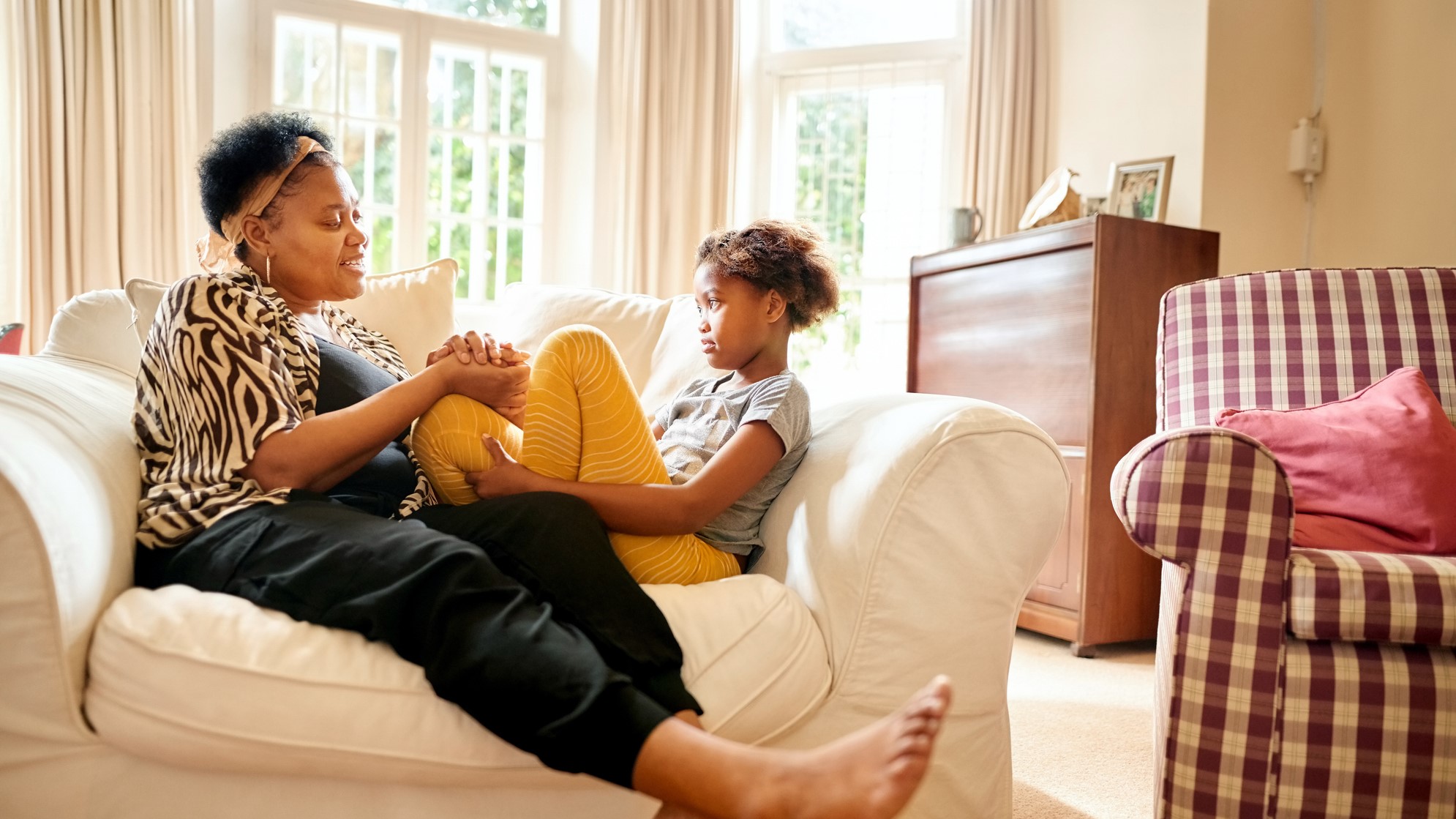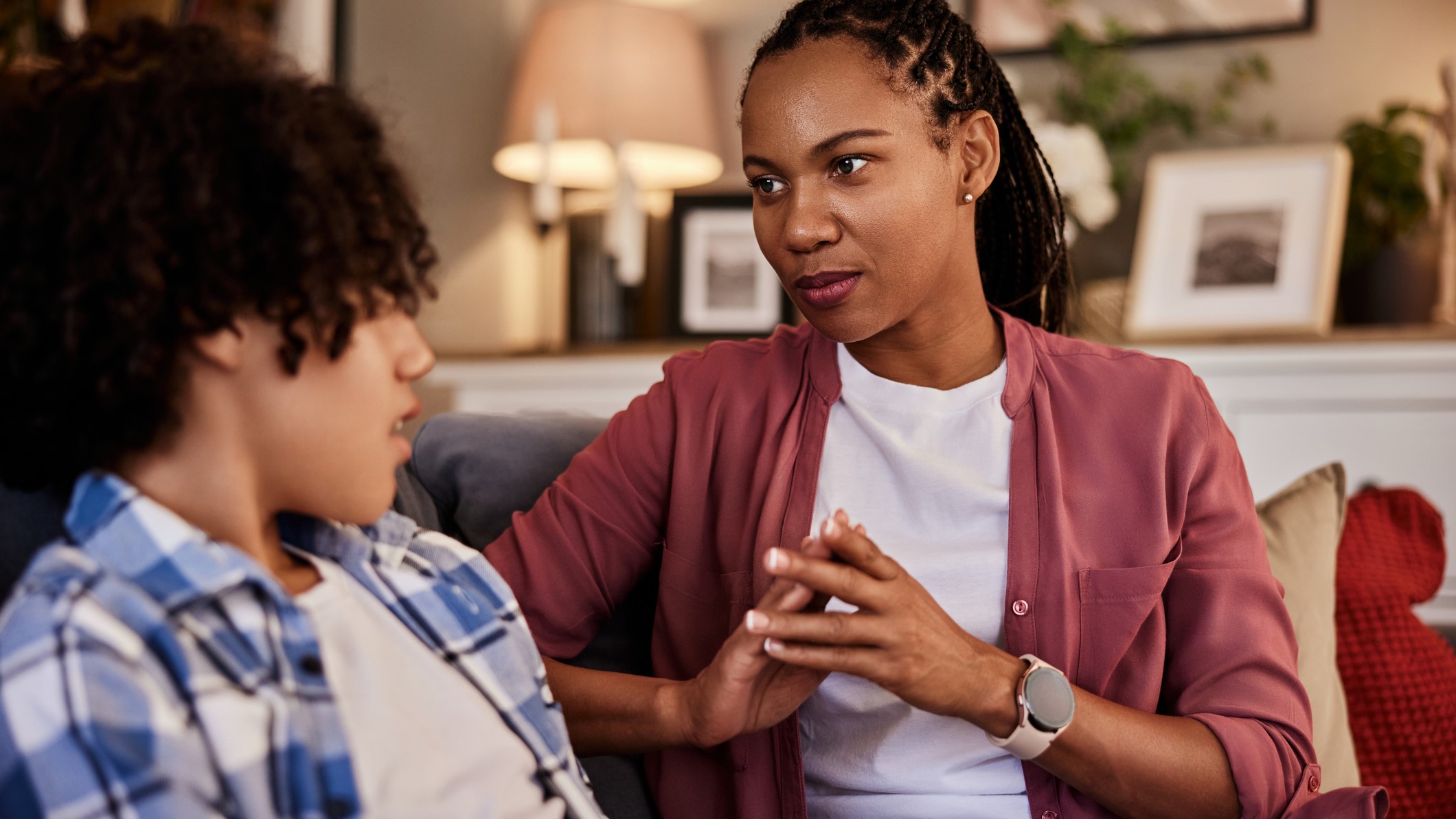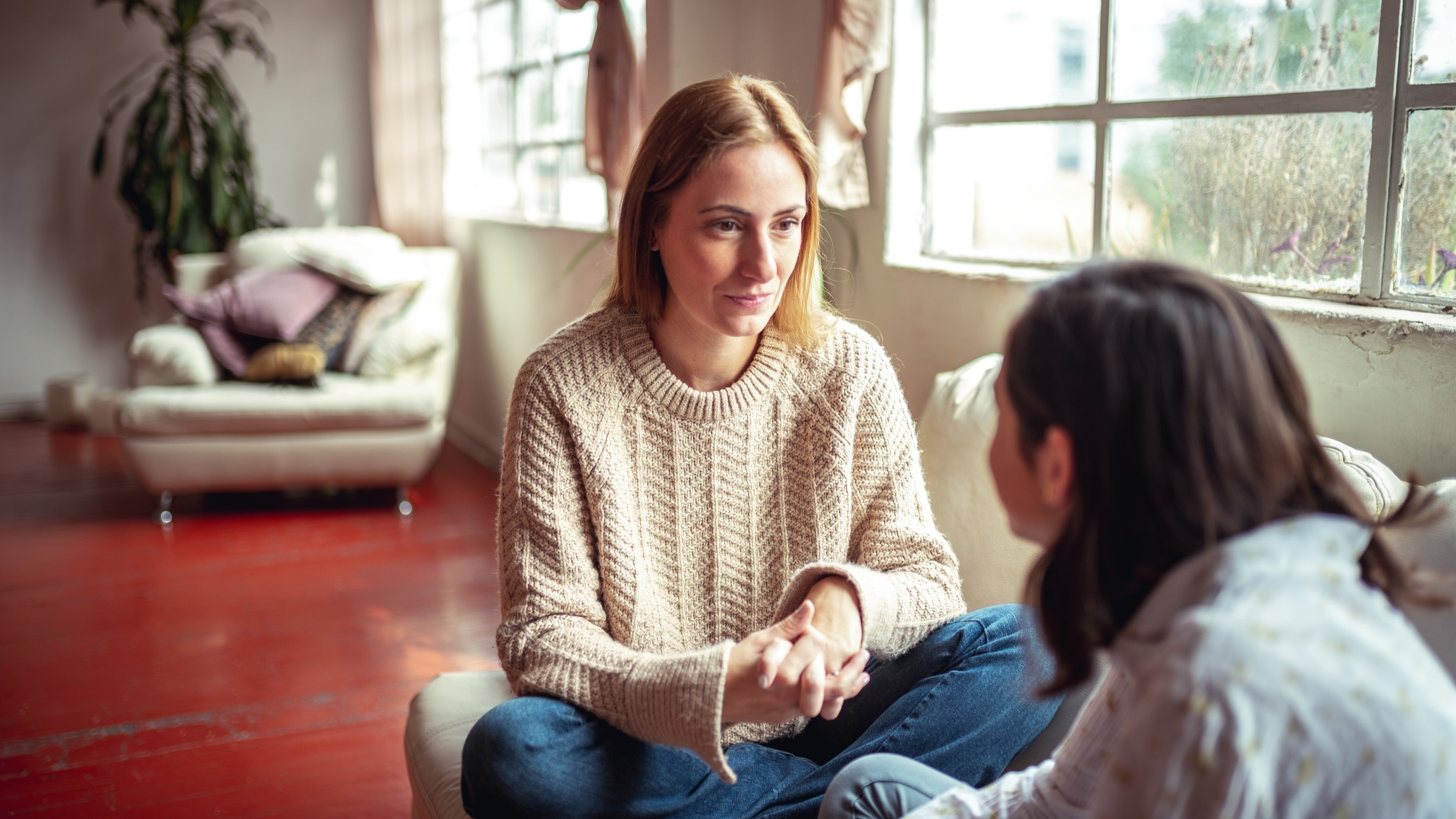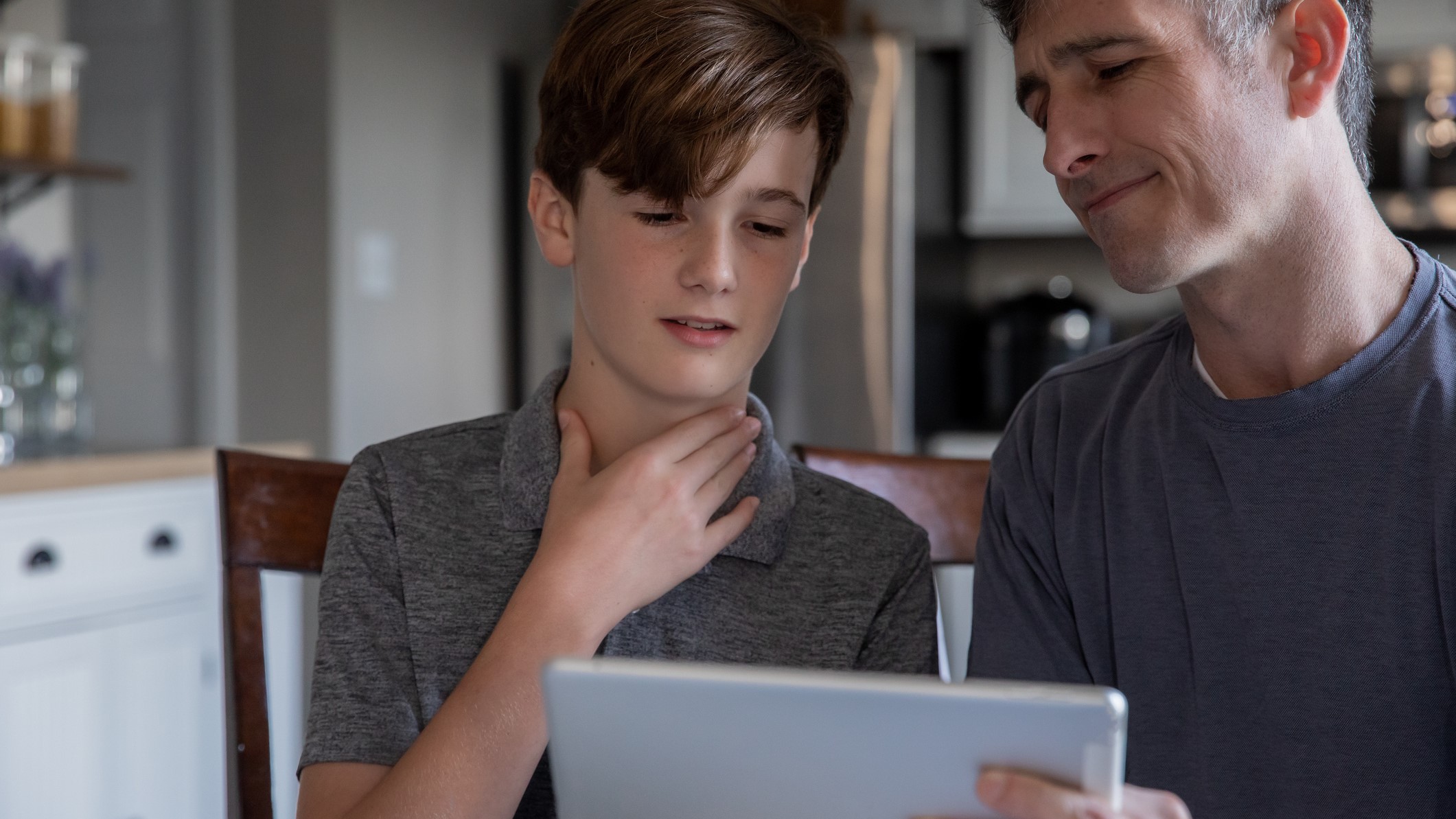
First of all, if you’re reading this, you know masturbation is normal and (pretty much) everyone does it. Find out how you can talk to your child, tween or teen about masturbation, especially if you never had these conversations with your parents when you were growing up.
If you’re a cycle breaker, you’ll know that it’s important not to pass on shame or judgment about masturbation to your child. You’ll want to give them all the information they need to feel comfortable and ready to talk to you if they have any important questions, and they will!
“Masturbation is a very important developmental stage in a child’s life. It’s where they learn about their body sexually, what they like and don’t like and how they might want a partner to be with them. It’s absolutely healthy and should be treated as such,” Katie McKenna and Helen Villiers, professional psychotherapists and the authors of the Sunday Times bestseller You’re Not the Problem: The Impact of Narcissism and Emotional Abuse and How to Heal tells us.
According to the Practical approach to childhood masturbation by the European Journal of Pediatrics, one in 10 children typically start masturbation, that is, rhythmically touching their genitals for pleasure, at around the age of seven. By the time they’re 13, eight in 10 children are masturbating. So it’s never too early to start, and ideally, you need to be talking about it well before your children hit puberty or when they start dating.
“It’s kind of strange when you think about it,” say Katie and Helen. “We make sure our kids are taught about everything else in life, from maths and science to how to cook and handle money. We wouldn’t just leave them clueless about these things, so why do we often skip over talking to children about sex?”
How early should we start talking about masturbation?
The earlier, the better, according to our experts and research. Talking to children in an age-appropriate way about their bodies is crucial. That means responding to questions with an open mind and using the correct anatomical terms for their sexual organs, such as ‘penis’ and ‘vagina’.
Clinical psychologist and author of How to Be the Grown-Up: Why Good Parenting Starts with You, Dr Martha, says, "Self-touch is a normal part of sexual development; it’s not dirty or perverse and talking about it is important. I recommend parents start talking about it when they notice their child touching themselves and reacting to it. It often happens when they are naked, either during a nappy change or in the bath."
“One of the benefits of starting conversations early is that the sooner you get the jump on the topic, the sooner you can start addressing your own discomfort with the subject,” says Rachel Coler-Mulholland, psychologist and author of The Birds, the Bees, and the Elephant in the Room - Talking to Your Kids About Sex & Other Sensitive Topics.
“I acknowledge how hard it might be to have these conversations with your child, but keep this in mind: according to Three Decades of Research: The Case for Comprehensive Sex Education by Goldfarb and Lieberman in The Journal of Adolescent Health (2021), a child who knows how their body works, who knows what feels good to their body, and who has been allowed to explore themselves is less likely to be exploring it with anyone else. If they touch their bodies, they are less likely to be convinced that anyone else should before they are ready.”
Talking about masturbation can also help protect your child from sexual violence, says Rachel. “Probably most convincingly, children and teens who know about their bodies and their boundaries are less likely to be coerced into engaging with others in ways they are not comfortable with.”
Talking about masturbation brings with it the need to talk about privacy and consent, say Katie and Helen. “Explain the concept of privacy and that certain parts of their bodies are private. For example, ‘You can touch your private parts in your room or the bathroom, but not in public places’.
Sarah, a mum of two, tells us that masturbation started early with her daughter but helped to break the ice. "When my daughter was a toddler, she used to regularly lie on the floor in our home and ‘explore’ herself. She was far too young to understand anything we said, so we would just let her be. It never lasted that long, and we always made sure her hands were clean afterwards. When I spoke to her about masturbation as she grew older, I used that as a conversation starter and an example of how natural and easy it is for children to explore their bodies, and we went from there!"
Teach them about the no pants rule from the NSPCC, which explains to young children about private areas and that no one other than themselves (or, if appropriate, a doctor) should be touching them in the area their pants cover. This gives even young children language to disclose any kind of sexual abuse they might experience.”
You can gradually introduce more detailed information as your child grows. “Children will be most curious about their bodies before they get close to puberty, and it’s important to harness this as an opportunity to discuss the changes their bodies will go through with them,” say Katie and Helen.
“Be open and honest, creating a safe space for them to ask questions. Talk about the physical changes they can expect during puberty, including increased interest in sexual feelings and masturbation. This is also an excellent time to talk to them about the opposite gender and the change those bodies go through too, for example, explaining what periods are to boys.”
How to talk to your kids about masturbation: 6 expert tips
1. Be prepared
Before initiating conversations about masturbation, take time to prepare yourself emotionally. As Rachel advises, "The first and most important step you can do as a parent facing these conversations with a feeling of dread is to sit with that feeling.
“Practice your emotional regulation skills so that when you are faced with a situation that makes you feel like you need to bolt out of the room, you can keep your composure and handle the situation effectively (rather than projecting that discomfort onto an unsuspecting child)”, says Rachel. “Then remember that you’re not going to get it perfect every time and that growth takes time and practice – you are trying to break cycles, and that’s hard work.”
"Talking about masturbation is often taboo to adults, and parents can feel embarrassed or ashamed (this is why I have written my Confident Parent course)", says Dr Martha. "Keep things simple and honest and remember - a first conversation doesn’t have to be perfect. You are likely to talk about this again."
Your body language and tone is also important, says Dr Martha. "It’s important to be aware of your facial expressions and your tone. Try and be matter of fact while showing warmth. Focus on what your child wants to learn."
2. Focus on two areas: Normalisation and boundaries
It’s essential to talk about these in tandem because your child needs to feel that what they are doing is natural, but it is a private activity. “Approach the topic of masturbation as a natural part of human development, just like talking about other aspects of health and hygiene,” say Katie and Helen. “Normalise the conversation by explaining that both boys and girls masturbate and that it’s a normal and healthy way to explore their bodies.”
At the same time, though, stress that it’s a private activity and there may be some good basic hygiene rules to follow. “Establishing boundaries around self-exploration is necessary to keep children physically and emotionally safer, says Rachel. “Boundaries should be based in science, succinct, and shame-free and need to be age-appropriate.”
3. Be age appropriate
For younger children, simple rules such as ‘clean hands only!’ and ‘bedroom or bathroom’ can help set boundaries in an age-appropriate way that they understand.
What you could say: Dr Martha suggests saying something like this to younger children: 'I know it feels good to touch your penis/vulva. It’s okay to enjoy your body, everybody does it. We call it masturbation, and it’s something you can do in private. You can do it in your room or the bathroom when you want to touch yourself. Doing it in front of people is not safe, and I will help you if you forget and start doing it on the sofa.'
Jen shares her son's first experience and how she wishes she could have been more frank in how she spoke about the subject with him. "My son started ‘wriggling’ in bed a few years ago when he was around 6 or 7. We called it ‘wriggling’, but now I wish we’d been more upfront about it and used the right term - ‘masturbation’. Although I’m not sure I was prepared for a conversation that early! Anyway, we told him what he was doing was okay and natural but that it was private and for his bedroom only."
However, Rachel points out that older kids can “get a little skittish’’ around the subject. “By this age, most of them have a firmly established sense of privacy that may extend to discussing their bodies so that conversations might end up more like statements, for example, ‘Please remember that there are condoms under the bathroom sink – they are easier to clean up than loads of tissue, and help you get used to the feeling of wearing one.’"
4. No shame, no judgement
Our experts can’t emphasise this point enough. The last thing you want to do is make your curious child feel ashamed of their body or their actions. As Katie and Helen advise, "Normalise the conversation. Approach the topic of masturbation as a natural part of human development, just like talking about other aspects of health and hygiene." Explain that it's normal for both boys and girls and encourage open communication.
“Do not perpetuate the myths – masturbation does not make you impure; it does not make you blind; and it does not cause sexual activity with a partner,” says Rachel. “Masturbation is simply an activity that people can engage in for many different reasons – for pleasure, to relieve sexual tension, to reduce stress, to enhance satisfaction with partners, and to promote rest and relaxation, to name a few. There are ways that masturbation can become problematic – if it starts to affect school or relationships negatively – but at its core, it is not inherently bad.”
"I have met many adults who were told they would grow hair on the palm of their hands or go blind if they masturbated!" says Dr Martha. "Try to avoid fear tactics and shouting 'stop doing that!' which will give your child the message that the good feeling they were experiencing is wrong or bad."
5. Pick the right time
If you feel nervous or uncomfortable about starting the conversation or think your child will consider a good time to have it. Katie and Helen suggest, "When having uncomfortable conversations, talking in a car with your child can be a good idea because the lack of eye contact can make the conversation feel less confrontational." This approach can reduce anxiety and pressure for both of you.
6. Use leaflets, books and websites
Absolutely - use additional resources to help you explain masturbation, but Katei and Helen say it’s not a substitute for a real conversation. "Don't just leave them on their bed. Actively give the resources to them, saying something like 'I know this is really awkward, but I thought it was important you read about this and have this information.'" And always leave the door open for future conversations. As Katie and Helen advise, let your child know that "if you want to discuss it, I'm always here." This reassurance can help your child feel comfortable coming to you with questions or concerns in the future.
What not to do when talking about masturbation
Don't avoid or delay these important conversations. As Rachel points out, "It might be tempting to put it off or think you can talk to them about when they're older and actually touching themselves.” But this approach can backfire. ”Self-exploration often starts in early childhood, and conversations should start then, too." Avoiding the topic can actually "sow the first seeds of shame." Instead, be prepared to have age-appropriate talks from an early age.
Don't let your discomfort show or shut down the conversation if you feel awkward. Katie and Helen advise, "Be honest in your explanations and stay calm, even if you feel uncomfortable." Kids are perceptive and can easily pick up on any embarrassment. If you act uncomfortable, they might think there's something wrong with asking questions or with masturbation itself. As Katie and Helen suggest, "If you don't know the answer to a question, it's okay to say, 'I don't know, but I can find out for you.'" Your honesty and openness will encourage your child to keep coming to you with questions.
Remember, your goal is to be a reliable source of accurate information and support for your child. By avoiding these common pitfalls, you're helping to create an environment where your child feels safe discussing their body and experiences without fear or shame. As Rachel reminds us, "I recognise how difficult it can feel to talk about these topics with your kids - especially if you were raised to feel ashamed of yourself." But pushing through that discomfort is crucial for your child's healthy development, and it’s what makes you a cycle-breaker.
What do I do if I walk in on my child masturbating?
It's probably every parent's nightmare and more common than you think. So here's how to approach it in a healthy, non-judgmental way, with advice from our experts.
"The first step is to notice what comes up for you – the thoughts and feelings that seeing your child self-touch sparks in your mind and body," says Dr Martha.
"Secondly, remember this is not an emergency. You don’t have to stop your child from doing it (unless they are hurting themselves), and you don’t have to do or say anything unless you feel calm enough to do so.

"If it is happening outside of a bedroom and you have spoken about masturbation, gently remind them that you know it feels good, but it needs to be done in a private room and guide them to it if you can.
"If this is a teenager, apologise for not knocking before entering their bedroom or bathroom. Children are allowed to have privacy, and as adults, this may be a useful reminder that seeking consent before entering a bedroom is necessary."
Rachel agrees that age matters. “In early childhood, it may be less like you’re walking ‘in on the act’ and more like ‘little Charlie is lying on his hands in the middle of the sitting room floor.' In these instances, a reminder of ‘privacy!’ or ‘bedroom or bathroom, Charlie!’ is probably enough to get the job done. As kids get older, though, and begin exploring their bodies with more purpose, parents must consider how they react when they accidentally interrupt a self-pleasure session.”
Rachel has put together these expert tips on what to do if you accidentally walk in on your child masturbating:
- Don’t freak out: Self-exploration and stimulation are natural, normal parts of the human experience. Freaking out, yelling, panicking, slamming the door, or screaming all fly in the face of the normalising that you’ve been trying to do. Instead, avert your eyes, shut the door, and do something else until your child has emerged from their room.
- Apologise: This step is imperative if the space you walked into is private (like their bedroom or the bathroom). Acknowledging your child’s right to privacy and autonomy must happen before further discussion – ‘I’m sorry I walked into your room/the bathroom.’ It’s as simple as that.
- Set some rules: An essential part of a good apology is ensuring it doesn’t happen again. If you walked in on your child masturbating because you failed to knock before you opened their door, pledge to start knocking. If it’s a matter of small or shared living space, identify ways your child can ask for privacy without having to verbally ask for privacy – a magnet, a piece of tape, or even a sock on the door. Find a way for your child to indicate to you and others that they want some time alone, and make sure they know they can have privacy for whatever reason, not just self-exploration time.
- Reflect: If, upon walking into your child’s space, you see something concerning, for example, materials you don’t think they should be engaging with, evidence of harmful activity, or participation with unsafe people, take time to consider how to best move forward in addressing your concerns. Identify supports available to you and your child that can help and decide how you will follow up on what you saw with your child.
What other topics of sex can I bring up with my child?
While you might quake at the idea of discussing pornography, sexual identity, sexting and consent with your child, we’re pretty sure nothing will be off the table after you’ve discussed masturbation. But if you’re still feeling prudish about it, consider where they will get this information, if not from you.

Online pornography is easily accessible via social media and other sites, while teenagers start swapping nudes, or at least talking about it, early on. Their peers, movies, YouTubers, TikTok, and TV shows are usually their first sources of information about these subjects, and it’s often harmful, reinforcing stereotypes or being inaccurate about what consent truly is.
“I’ll be the first to admit that it feels weird to consider talking about intimacy with my children, but when you step back and think about it for a second, books, television, and movies are already giving them the information…only less accurately and significantly less helpfully!” says Rachel.
“Thankfully, intimacy, love, and relationships are like most other sensitive and complex topics - they can be discussed in small bites over time. There’s no need to navigate one big sit-down talk covering everything necessary for your children to be happy in life, mainly because that would be both ineffective and impossible!
Instead, Rachel suggests frequent check-ins and modelling your own priorities, values, and healthy relationships (both platonic and romantic) to help show your child what they should aim for as they navigate the world of intimacy, dating, and relationships.
Helpful podcasts, sites and books for parents
The following books, podcast and websites can help you and your child start the conversation:
- The Birds, the Bees, and the Elephant in the Room - Talking to Your Kids About Sex & Other Sensitive Topics by Rachel Coler Mulholland
- Birds, bees and kids. A website, podcast and book designed for parents.
- Sex is a Funny Word: A Book about Bodies, Feelings and YOU, by Cory Silverberg and Fiona Smyth (8-10 years)

- Dr Martha on Instagram
- Birds & Bees. An online course, podcast and advice site.
- Podcast: Talking to your children about sex, consent and masturbation.
- You Know, Sex: Gender, Puberty and Other Things, by Cory Silverberg and Fiona Smyth (10+ years)
- Can We Talk About Consent? by Justin Hancock & Fuschia MacAree (for 14+ and adults)
Featured experts
If you struggle to connect with your teenager, here are 25 brilliant ways to open up a conversation with them, with plenty of advice from our experts. Plus, here are the five most important things you should talk to your teen about before they start dating, and what to do if your teenager is drawn to taking risks.







